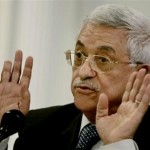Tuesday
Oct272009
Israel-Palestine: Clinton Tries to Help Abbas
 Tuesday, October 27, 2009 at 6:52
Tuesday, October 27, 2009 at 6:52
Israel: Netanyahu and Barak Limit the Gaza Inquiry
Receive our latest updates by email or RSS SUBSCRIBE TO OUR FEED
Buy Us A Cup of Coffee? Help Enduring America Expand Its Coverage and Analysis
 Mahmoud Abbas, the leader of the Palestinian Authority, is using every means available to press Washington on the Israel-Palestine issue. It emerged yesterday that last week Abbas told President Obama by phone last week that he wants to leave his post since he sees no chance for peace with Israeli Prime Minister Benjamin Netanyahu.
Mahmoud Abbas, the leader of the Palestinian Authority, is using every means available to press Washington on the Israel-Palestine issue. It emerged yesterday that last week Abbas told President Obama by phone last week that he wants to leave his post since he sees no chance for peace with Israeli Prime Minister Benjamin Netanyahu.
On the same day, Palestinian chief negotiator Saeb Erekat blamed Israel for the current impasse:
Secretary of State Hillary Clinton has joined the debate, saying that the Abbas administration must be bolstered against Israel's unwillingness and Hamas's resistance. She suggested that Israel carry out a series of goodwill actions and show greater flexibility to facilitate the resumption of talks and thatArab foreign ministers, meeting in Morocco on 2 November, step up their political and economic support for Abbas vis-a-vis Hamas.
It is unclear, however, what Washington will or can do beyond Clinton's general call. Israel has already stated that it will stop settlement constructions temporarily without the "natural growth." "One more step" means the demand on Israel for the full concession of a complete halt. As for the request to Arab foreign ministers to increase their support to the Palestine Authority: will that be enough to destroy Hamas or will it only contribute to a tougher line by the Gazan leadership?
Abbas will probably not resign; after all, he just gambled on his political future by announcing January elections. Look instead for him and Netanyahu to nod their hands as negotiations continue to drift about very distant peace talks.
Receive our latest updates by email or RSS SUBSCRIBE TO OUR FEED
Buy Us A Cup of Coffee? Help Enduring America Expand Its Coverage and Analysis
 Mahmoud Abbas, the leader of the Palestinian Authority, is using every means available to press Washington on the Israel-Palestine issue. It emerged yesterday that last week Abbas told President Obama by phone last week that he wants to leave his post since he sees no chance for peace with Israeli Prime Minister Benjamin Netanyahu.
Mahmoud Abbas, the leader of the Palestinian Authority, is using every means available to press Washington on the Israel-Palestine issue. It emerged yesterday that last week Abbas told President Obama by phone last week that he wants to leave his post since he sees no chance for peace with Israeli Prime Minister Benjamin Netanyahu.On the same day, Palestinian chief negotiator Saeb Erekat blamed Israel for the current impasse:
The gap is still wide and Israel does not give a single sign of meeting its obligations under the road map, halting settlement activities and resuming negotiations where they left off. I do not see any possibility for restarting peace talks in the near future.
Secretary of State Hillary Clinton has joined the debate, saying that the Abbas administration must be bolstered against Israel's unwillingness and Hamas's resistance. She suggested that Israel carry out a series of goodwill actions and show greater flexibility to facilitate the resumption of talks and thatArab foreign ministers, meeting in Morocco on 2 November, step up their political and economic support for Abbas vis-a-vis Hamas.
It is unclear, however, what Washington will or can do beyond Clinton's general call. Israel has already stated that it will stop settlement constructions temporarily without the "natural growth." "One more step" means the demand on Israel for the full concession of a complete halt. As for the request to Arab foreign ministers to increase their support to the Palestine Authority: will that be enough to destroy Hamas or will it only contribute to a tougher line by the Gazan leadership?
Abbas will probably not resign; after all, he just gambled on his political future by announcing January elections. Look instead for him and Netanyahu to nod their hands as negotiations continue to drift about very distant peace talks.


 The Goldstone Report on the Gaza War is no longer a set of findings on possible crimes by both sides during the fighting. So, an enquiry that was supposed to cast bring light on the bombed rubbleis now a political tool to be wielded against the "enemy". And that is not only the "enemy" in the Israel-Palestine conflict but also within Palestinian politics.
The Goldstone Report on the Gaza War is no longer a set of findings on possible crimes by both sides during the fighting. So, an enquiry that was supposed to cast bring light on the bombed rubbleis now a political tool to be wielded against the "enemy". And that is not only the "enemy" in the Israel-Palestine conflict but also within Palestinian politics. UEFA president Michel Platini said, during a visit to Jerusalem on Tuesday, that he believes
UEFA president Michel Platini said, during a visit to Jerusalem on Tuesday, that he believes